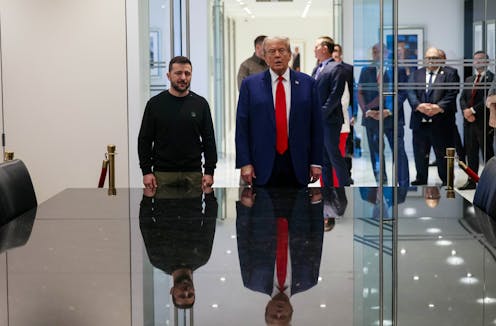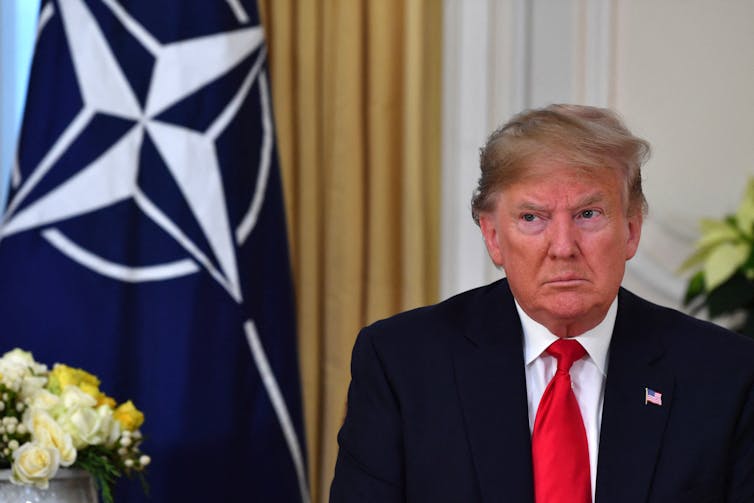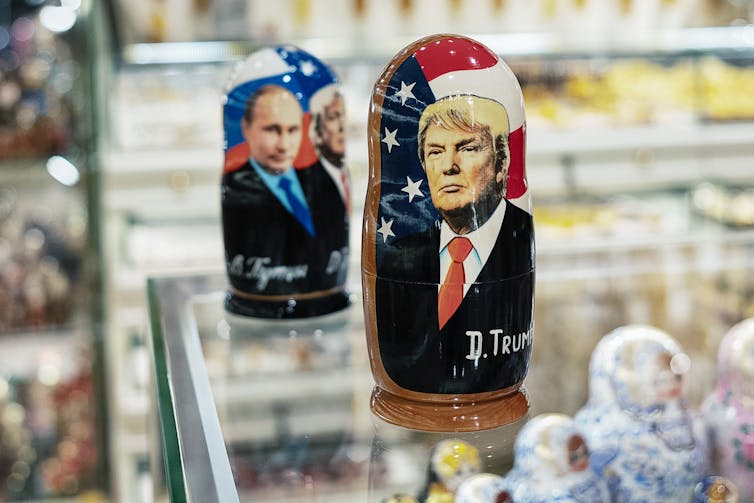3 reasons why a Trump White House might not be a disaster for Ukraine − in fact, it might tighten th
Donald Trump has vowed to bring peace to Ukraine. But talk of a ‘deal’ has led to questions over Trump’s commitment to Kyiv.

Among the first world leaders to speak with Donald Trump following his election victory on Nov. 5, 2024 was Ukrainian President Volodymyr Zelenskyy. Congratulating the U.S. president-elect, Zelenskyy expressed confidence in the “potential for stronger cooperation” between the two nations.
Others are less sure. For many foreign policy observers, Trump’s victory – together with his lukewarm attitude toward NATO, criticism of the amount of U.S. aid being sent to Ukraine and vows to reach a deal to end the ongoing war in Eastern Europe – has stoked uncertainty over Washington’s commitment to doing everything it can to support Ukraine repel Russian invaders.
As a scholar on Eastern Europe, I understand where these concerns come from. But I also offer a counter view: that a Trump White House may not necessarily be bad news for Kyiv.
NATO’s mission to counter Russia remains unchanged
It is common to hear Trump described as isolationist, nationalistic and an anti-interventionist on the world stage. He has encouraged such a view through claims, for example, that the U.S. would shirk its responsibility to come to the defense of a NATO member against a Russian attack if that country was not meeting its defense spending targets in line with the alliance’s commitments.
But such rhetoric is undercut by established facts and prior Republican positions.
In December 2023, the U.S. Congress passed bipartisan legislation prohibiting a president from unilaterally withdrawing the U.S. from NATO, maintaining the overarching security and stability of Europe is in the U.S.’s interests. The Republican co-sponsor of that bill, Sen. Marco Rubio, has in recent months emerged as a key Trump surrogate and is expected to be named as Trump’s secretary of state, according to reports.

The U.S. and Europe remain each other’s most important markets. As such, the United States will be highly motivated to maintain a role in European security so long as instability in Europe can influence the global – and U.S. – economy.
Moreover, there is nothing to suggest that the incoming administration will deviate from those of Obama, Biden and indeed Trump’s first term in seeing China as the primary threat to the U.S. And Beijing has thrown its support behind Russian President Vladimir Putin during his military efforts in Ukraine.
Continued U.S. cooperation with allies in Europe will also strengthen Washington in Asia. Direct military cooperation, such as coordinating with the British to produce submarines for Australia, helps the U.S. strategy to counter and contain China’s threat in the Pacific. It would also signal to U.S. allies in Asia – such as Japan, South Korea and Taiwan – that Washington is a dependable security partner in times of crisis.
Trump isn’t as cozy with Putin as often portrayed
Much has been made of Trump’s perceived cozy relationship with Putin. In the run-up to the election, Trump insisted that, should he win, he would bring peace to Ukraine even before he was inaugurated and called Putin “genius” and “savvy” for the Ukrainian invasion. On his part, Putin congratulated Trump on his victory, praising him for being “courageous” when a gunman tried to assassinate him. Moscow has also indicated that it is ready for dialogue with the Republican president-elect.
Trump’s actual policy toward Russia during his first term was notably more hawkish than these words may suggest. Indeed, there is a good argument that the Trump administration was more hawkish on Putin than the Obama one it replaced.
For example, Trump provided the Ukrainians with anti-tank missiles after the Obama administration had refused to give them such weapons. Also, in 2018, the U.S. withdrew from the Intermediate-Range Nuclear Forces Treaty, citing the previous violations of the treaty by Russia. In contrast, in 2014, then President Barack Obama accused Russia of breaching the INF treaty after it allegedly tested a ground-launched cruise missile but chose not to withdraw from the treaty.
Russia’s deputy foreign minister, Sergei Ryabkov, referred to that move as “a very dangerous step.” The Intermediate-Range Nuclear Forces Treaty constrained the U.S. from developing new weapons and tied Washington’s hands in its strategic rivalry with China in the Pacific.
Then, in 2019, Trump signed the Protecting Europe’s Energy Security Act, which included sanctions halting the construction of the Russian-backed Nord Stream 2 pipeline directly connecting Russia to Germany, via the Baltic Sea. The pipeline, which has since been rendered inoperable by a sabotage attack in 2022, would have bypassed Ukraine, prompting the Ukrainian government to label it an “economic and energy blockade.” It was one of 52 policy actions undertaken by the first Trump administration to restrict Russia.
In contrast, the Biden administration waived Nord Stream 2 pipeline sanctions in 2021, only to reimpose them on Feb. 23, 2022 – one day before Russia’s full-scale invasion of Ukraine.

‘Drill, baby, drill’ will hurt Russian oil
Almost three years into Russia’s full-scale invasion of Ukraine, the Kremlin’s war machine still runs on energy revenues. Despite unprecedented Western sanctions aimed at restricting sales of Russian oil, countries continue to purchase from Russia. For example, India has become the biggest buyer of Russian seaborne crude oil.
And here a Trump policy not aimed directly at Russia may, in fact, harm Russian interests.
Trump has made repeated promises to introduce a new wave of drilling for oil and gas on American soil. And while it might take time for this to filter through to lower prices globally, increased production from the U.S. – already the world’s top crude oil producer – has the capacity to make an impact.
Trump’s return to the White House could mean tougher enforcement of U.S. oil sanctions against Iran, reducing Tehran’s capacity to sell weapons to Russia. Iran has supported Russia both diplomatically and militarily since the beginning of the invasion of Ukraine in February 2022. And since 2020, Iran’s revenue from oil exports nearly quadrupled, from US$16 billion to $53 billion in 2023, according to the U.S. Energy Information Administration.
Predicting what Trump, a notably unpredictable leader, will do in power is difficult. And U.S. foreign policy can be a slow-moving beast, so one should not expect immediate breakthroughs or major surprises. But his record serves as a counter to the views of observers who have suggested that his victory does not bode well for Ukraine.
Tatsiana Kulakevich does not work for, consult, own shares in or receive funding from any company or organization that would benefit from this article, and has disclosed no relevant affiliations beyond their academic appointment.
Read These Next
Why US third parties perform best in the Northeast
Many Americans are unhappy with the two major parties but seldom support alternatives. New England is…
Abortion laws show that public policy doesn’t always line up with public opinion
Polls indicate majority support for abortion rights in most states, but laws differ greatly between…
The cost of casting animals as heroes and villains in conservation science
New research shows how these storytelling choices can distort science – and how to move beyond them.





